|
|
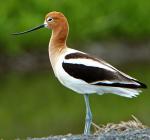
|
American Avocet
|
Overview
American Avocet: Long-legged shorebird with long, thin, upcurved bill and distinctive black-and-white back and sides. Head and neck are bright rust-brown during summer. Legs and feet are gray. Feeds on insects, crustaceans, and invertebrates. Strong direct flight with neck extended. |
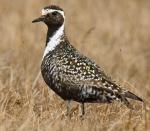
|
American Golden-Plover
|
Overview
American Golden-Plover: Medium sandpiper with black face, underparts. Back is dark brown with yellow spots; has a white S-shaped mark along head and sides. Markings provide camouflage to blend in with tundra breeding grounds. Bill is black, thin, and short. Swift direct flight on rapid wing beats. |
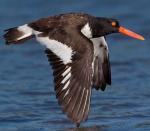
|
American Oystercatcher
|
Overview
American Oystercatcher: Large shorebird with white underparts, brown upperparts, black hood, long, bright red-orange needle-shaped bill. White wing patches visible in flight. Yellow eyes surrounded by orange eye-rings. Legs and feet are pink. Feeds on mussels and other bivalves. Rapid direct flight. |
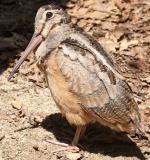
|
American Woodcock
|
Overview
American Woodcock: Medium, stocky sandpiper with buff-brown underparts and dark-streaked gray-brown upperparts. Head shows black bars rather than the stripes of most other sandpipers. Eyes are black and very large; bill is dull yellow with a black tip and is long and stout. Pale gray legs and feet. |
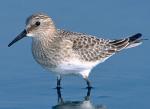
|
Baird's Sandpiper
|
Overview
Baird's Sandpiper: Medium sandpiper with scaled, gray-brown upperparts, white underparts, and dark-spotted, gray-brown breast. Crown, face, and neck are buff with fine, dark brown streaks. Rump is white with dark central stripe extending through the center of gray-brown tail. Black legs and feet. |
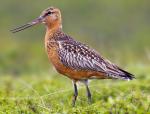
|
Bar-tailed Godwit
|
Overview
Bar-tailed Godwit: Large shorebird, long upcurved bill, scaled brown, black and gray mottled upperparts, pale red-brown underparts. Tail is white with distinctive dark bars. Legs, feet are dark gray. Feeds by wading in water, probing mud with side-to-side motion. Direct flight with steady wingbeats. |
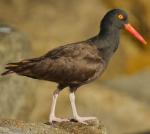
|
Black Oystercatcher
|
Overview
Black Oystercatcher: Large stocky brown-black shorebird with long,bright orange bill and glaring yellow eyes with contrasting orange eyering. The legs and feet are pink. Feeds primarily on limpets and other shellfish, also eats mussels and marine worms. Rapid direct flight with shallow wing beats. |
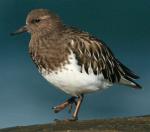
|
Black Turnstone
|
Overview
Black Turnstone: Medium sandpiper, scaled black upperparts, white spot between eye and bill, black breast with white speckles on sides, and white belly. Short, dark bill slightly upturned. Back, wings, and rump display a dramatic black-and-white pattern in flight. Swift flight on rapid wing beats. |
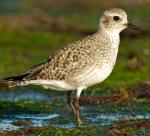
|
Black-bellied Plover
|
Overview
Black-bellied Plover: Medium-sized shorebird with black upperparts vividly marked with a white spot on each feather. Face, throat, and belly are black. White forehead and crown, extends over eye and down back, sides of neck. Black armpit and white rump, vent, and wing stripe are visible in flight. |
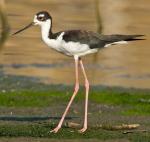
|
Black-necked Stilt
|
Overview
Black-necked Stilt: Large shorebird with sharply contrasting black upperparts and white underparts. Long, thin, upcurved bill. Red eyes with white eye-rings, and white patch above. Legs are extremely long and red-pink. Feeds on insects, fish, worms, small crustaceans and seeds. Swift direct flight. |
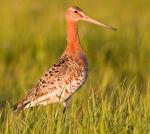
|
Black-tailed Godwit
|
Overview
Black-tailed Godwit: Large, tall godwit with black-barred, orange-brown body. Orange-brown head and neck, and white mark between eye and bill; combination of prominent white rump, white wing bar, and pure white underwings is unique among the godwits. Black-tipped yellow bill is long and straight. |
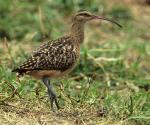
|
Bristle-thighed Curlew
|
Overview
Bristle-thighed Curlew: Large, brown-streaked shorebird with long decurved bill. Eye-line is dark, contrasting eyebrow is white. Rump is cinnamon-brown. Bristle-like feathers at base of legs are inconspicuous. Legs and feet are blue-gray. Strong, swift direct flight with legs trailing behind tail. |
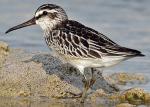
|
Broad-billed Sandpiper
|
Overview
Broad-billed Sandpiper: Small sandpiper with a long bill that curves down at the tip. Pale-edged dark brown feathers on upperparts give a scaled appearance; back shows two pale streaks in flight; underparts are white with dark spots on breast and neck. Head has dark cap and forked white eyebrows. |
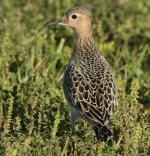
|
Buff-breasted Sandpiper
|
Overview
Buff-breasted Sandpiper: Medium sandpiper, buff wash over entire body except for white vent. Upperparts are black-spotted and streaked, underparts are slightly scaled. Shows white wing linings in flight. Has white eye-ring and black bill. Legs are yellow. Swift direct flight with rapid wing beats. |
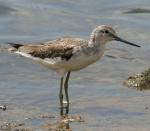
|
Common Greenshank
|
Overview
Common Greenshank: Large sandpiper with scaled gray-brown upperparts, white rump, and white underparts, streaked and spotted with brown on flanks and sides. Yellow-green legs. Bill is slightly upturned. Eats small fish, insects and larvae. Swift direct flight with clipped wing beats. |
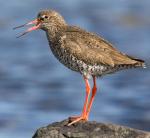
|
Common Redshank
|
Overview
Common Redshank: Large sandpiper, scaled black and brown upperparts, dark-streaked neck and breast, white eye-ring broken in front, pale belly and sides with dark chevrons. Dark wings with white trailing edges visible in flight. Legs are orange-red. Short bill is red with black tip. |
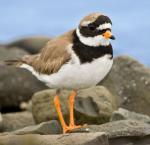
|
Common Ringed Plover
|
Overview
Common Ringed Plover: Plump little plover with dark gray-brown upperparts, pure white underparts, and strong black mask and chest band. Base of dark-tipped bill and legs are bright orange. Frequents mudflats. Eats worms, aquatic insects, crustaceans and mollusks. Direct flight with rapid wing beats. |
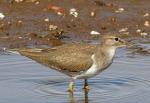
|
Common Sandpiper
|
Overview
Common Sandpiper: Eurasian counterpart to the Spotted Sandpiper; has dusky gray upperparts, heavily streaked breast, and sparkling white underparts. Best distinguished by its habit of standing in a semi-crouch and bobbing back and forth. Flies low over water with stiff shallow wing beats and glides. |
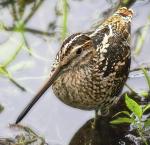
|
Common Snipe
|
Overview
Common Snipe: Longest-billed of all snipes, best identified by broad white stripe at base of underwing. Upperparts cryptically colored with brown and yellow-brown streaks of many different shades. Underparts white but strongly suffused with orange wash, heavily barred and streaked with dark brown. |
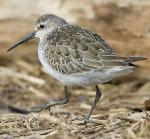
|
Curlew Sandpiper
|
Overview
Curlew Sandpiper: Medium-sized sandpiper with mottled rufous, white, and black upperparts. Head, neck and breast are a rich rufous while vent, undertail coverts and underwings are white. Black bill is long and slightly decurved. The legs and feet are black. Swift direct flight with rapid wing beats. |
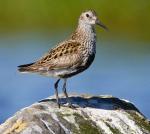
|
Dunlin
|
Overview
Dunlin: Medium-sized sandpiper with black-streaked, red-brown upperparts, conspicuous black belly patch, and streaked breast. The black bill is long and slightly decurved. Legs and feet are black. Wades in shallows and uses bill to probe and pick up food. Swift direct flight with rapid wing beats. |
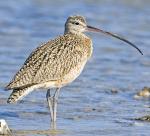
|
Eskimo Curlew
|
Overview
Eskimo Curlew: Small curlew, brown mottled upperparts, buff underparts streaked and mottled brown, and pale cinnamon wing linings. Bill is moderately short, not as strongly curved as similar curlews. Crown has two dark stripes. Wings noticeably long on perched bird. Last sighted in Canada in 1982. |
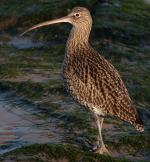
|
Eurasian Curlew
|
Overview
Eurasian Curlew: Large curlew, strongly marked underparts lack rich orange or buff tones that other long billed curlews often show. Brown upperparts. Large, decurved bill, black upper mandible, lower mandible has pink base. In flight it shows prominent white lower back, rump, and underwing linings. |
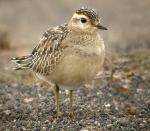
|
Eurasian Dotterel
|
Overview
Eurasian Dotterel: Medium-sized shorebird with gray upperparts, rust-brown flanks and belly with black lower margin, and white vent. Narrow white breast band is prominent. Cap is dark and two white eyestripes meet in a V at nape. Feet and legs are yellow. Swift direct flight with rapid wing beats. |
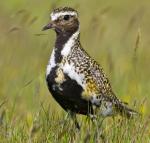
|
European Golden-Plover
|
Overview
European Golden-Plover: Largest of the golden plovers, showing black crown, throat, neck and upperparts with small bright gold spotting. White band on forehead runs down sides of neck and along flank; black underparts are trimmed in white. Undertail is white and the legs are short and dark gray. |
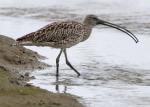
|
Far Eastern Curlew
|
Overview
Far Eastern Curlew: Largest curlew, very long, decurved bill, longest of any shorebird. Dark brown with heavily streaked underparts. Blue-gray legs, feet. Eats crustaceans, marine worms, insects, larvae, invertebrates. Strong steady flight, rapid wing beats. Flies in straight line or V formation. |
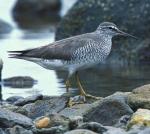
|
Gray-tailed Tattler
|
Overview
Gray-tailed Tattler: Medium sandpiper with gray upperparts and cap, white eyebrow and throat, gray streaked breast, and pale gray underparts. Wings and tail are dark. Legs and feet are yellow. Eats insects and larvae, picks up food in sand and water. Direct flight, quick wing beats. |
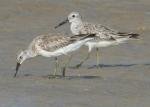
|
Great Knot
|
Overview
Great Knot: Medium sandpiper with brown upperparts showing dark spots on crown and back, and white underparts with black spots on breast and sides. Bill is short and black. Wings show bright patch of orange-brown on coverts. Legs and feet are gray-green. Swift direct flight with rapid wing beats. |
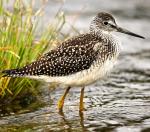
|
Greater Yellowlegs
|
Overview
Greater Yellowlegs: Large sandpiper with mottled brown, gray, and white upperparts. Underparts are white with dark streaks, spots. Bill is slightly upturned. Legs are long and bright yellow. Long barred tail and white rump are conspicuous in flight. Swift direct flight, sometimes at great heights. |
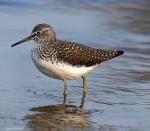
|
Green Sandpiper
|
Overview
Green Sandpiper: Medium sandpiper with pale-spotted, dark gray-brown back and rump, white underparts with dark streaks on neck, upper breast, sides. Head is dark and eye-ring is white. Tail is white with fine dark spotting at tip. Bill, legs, feet are olive-green. Swift flight with rapid wing beats. |
|
|